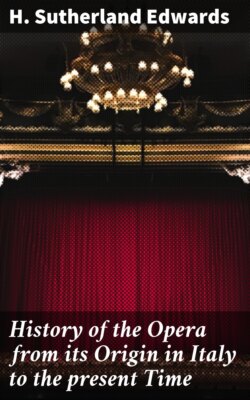History of the Opera from its Origin in Italy to the present Time

Реклама. ООО «ЛитРес», ИНН: 7719571260.
Оглавление
H. Sutherland Edwards. History of the Opera from its Origin in Italy to the present Time
History of the Opera from its Origin in Italy to the present Time
Table of Contents
HISTORY OF THE OPERA
CHAPTER I. PREFACE, PRELUDE, PROLOGUE, INTRODUCTION, OVERTURE, ETC.—THE ORIGIN OF THE OPERA IN ITALY, AND ITS INTRODUCTION INTO GERMANY.—ITS HISTORY IN EUROPE; DIVISION OF THE SUBJECT
CHAPTER II. INTRODUCTION OF THE OPERA INTO FRANCE AND ENGLAND
CHAPTER III. ON THE NATURE OF THE OPERA, AND ITS MERITS AS COMPARED WITH OTHER FORMS OF THE DRAMA
CHAPTER IV. INTRODUCTION AND PROGRESS OF THE BALLET
CHAPTER V. INTRODUCTION OF ITALIAN OPERA INTO ENGLAND
CHAPTER VI. THE ITALIAN OPERA UNDER HANDEL
CHAPTER VII. GENERAL VIEW OF THE OPERA IN EUROPE IN THE EIGHTEENTH CENTURY UNTIL THE APPEARANCE OF GLUCK
CHAPTER VIII. FRENCH OPERA FROM LULLI TO THE DEATH OF RAMEAU
CHAPTER IX. ROUSSEAU AS A CRITIC AND AS A COMPOSER OF MUSIC
CHAPTER X. GLUCK AND PICCINNI IN PARIS
HISTORY. OF. T H E O P E R A,
CONTENTS
HISTORY OF THE OPERA
CHAPTER XI
CHAPTER XII. OPERA IN FRANCE, AFTER THE DEPARTURE OF GLUCK
CHAPTER XIII. THE FRENCH OPERA BEFORE AND AFTER THE REVOLUTION
CHAPTER XIV
CHAPTER XV. MANNERS AND CUSTOMS AT THE LONDON OPERA, HALF A CENTURY SINCE
CHAPTER XVI. ROSSINI AND HIS PERIOD
CHAPTER XVII. OPERA IN FRANCE UNDER THE CONSULATE, EMPIRE, AND RESTORATION
CHAPTER XVIII. DONIZETTI AND BELLINI
CHAPTER XIX. ROSSINI—SPOHR—BEETHOVEN—WEBER AND HOFFMANN
INDEX, HISTORICAL AND BIOGRAPHICAL
Отрывок из книги
H. Sutherland Edwards
With Anecdotes of the Most Celebrated Composers and Vocalists of Europe
.....
"At present, our notions of music are so very uncertain, that we do not know what it is we like; only, in general, we are transported with anything that is not English; so it be of foreign growth, let it be Italian, French, or High Dutch, it is the same thing. In short, our English music is quite rooted out, and nothing yet planted in its stead."
The Spectator was written from day to day, and was certainly not intended for our entertainment; yet, who can fail to be amused at the description of the stage king "who spoke in Italian and his slaves answered him in English;" and of the lover who "frequently made his court and gained the heart of his princess in a language which she did not understand?" What, too, in this style of humour, can be better than the notion of the audience getting tired of understanding half the opera, and, to ease themselves of the trouble of thinking, so ordering it that the whole opera is performed in an unknown tongue; or of the performers who, for all the audience knew to the contrary, might be calling them names and abusing them among themselves; or of the probable reflection of the future historian, that "in the beginning of the 18th century the Italian tongue was so well understood in England that operas were acted on the public stage in that language?" On the other hand, we have not, it is true, heard yet of any historian publishing the remark suggested by Addison; probably, because those historians who go to the opera—and who does not?—are quite aware that to understand an Italian opera, it is not at all necessary to have a knowledge of the Italian language. The Italian singers might abuse us at their ease, especially in concerted pieces, and in grand finales; but they might in the same way, and equally, without fear of detection, abuse their own countrymen. Our English vocalists, too, might indulge in the same gratification in England, and have I not mentioned that at the Grand Opera of Paris—
.....